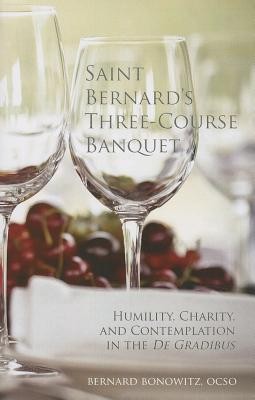
- We will send in 10–14 business days.
- Author: Bernard Bonowitz
- Publisher: Cistercian Publications
- ISBN-10: 0879070390
- ISBN-13: 9780879070397
- Format: 14 x 21.5 x 1.2 cm, minkšti viršeliai
- Language: English
- SAVE -10% with code: EXTRA
Reviews
Description
Saint Bernard's famous work, The Steps of Humility and Pride (in Latin, De gradibus humilitatis et superbiae), is a short book consisting of a mere fifty-seven paragraphs. In it, the Abbot of Clairvaux unpacks the doctrine of the very crucial chapter 7 of Saint Benedict's sixth-century Rule for Monks, which explores the dynamic "steps" or "degrees" of both humility and pride. This chapter by Benedict could well be considered the spiritual basis of all Benedictine existence.
In Saint Bernard's Three-Course Banquet, Dom Bernard Bonowitz makes the teaching of both Bernard and Benedict accessible to modern readers in a set of conferences originally conceived for and delivered to a group of Cistercian "juniors," that is, monks and nuns who had completed their novitiate but had not yet made their solemn vows. With Dom Bernard as a guide, many more readers can be sure of drinking at the purest sources of the monastic tradition, which at that depth becomes one with the Gospel itself.
EXTRA 10 % discount with code: EXTRA
The promotion ends in 23d.08:56:14
The discount code is valid when purchasing from 10 €. Discounts do not stack.
- Author: Bernard Bonowitz
- Publisher: Cistercian Publications
- ISBN-10: 0879070390
- ISBN-13: 9780879070397
- Format: 14 x 21.5 x 1.2 cm, minkšti viršeliai
- Language: English English
Saint Bernard's famous work, The Steps of Humility and Pride (in Latin, De gradibus humilitatis et superbiae), is a short book consisting of a mere fifty-seven paragraphs. In it, the Abbot of Clairvaux unpacks the doctrine of the very crucial chapter 7 of Saint Benedict's sixth-century Rule for Monks, which explores the dynamic "steps" or "degrees" of both humility and pride. This chapter by Benedict could well be considered the spiritual basis of all Benedictine existence.
In Saint Bernard's Three-Course Banquet, Dom Bernard Bonowitz makes the teaching of both Bernard and Benedict accessible to modern readers in a set of conferences originally conceived for and delivered to a group of Cistercian "juniors," that is, monks and nuns who had completed their novitiate but had not yet made their solemn vows. With Dom Bernard as a guide, many more readers can be sure of drinking at the purest sources of the monastic tradition, which at that depth becomes one with the Gospel itself.


Reviews